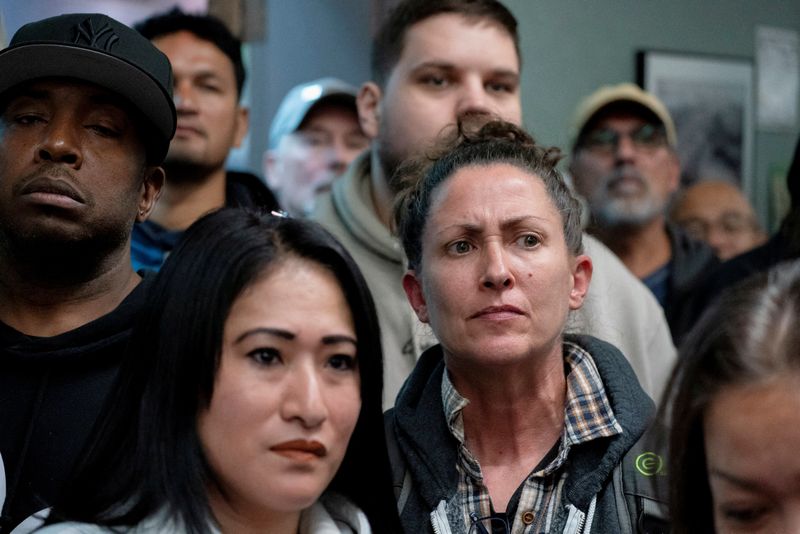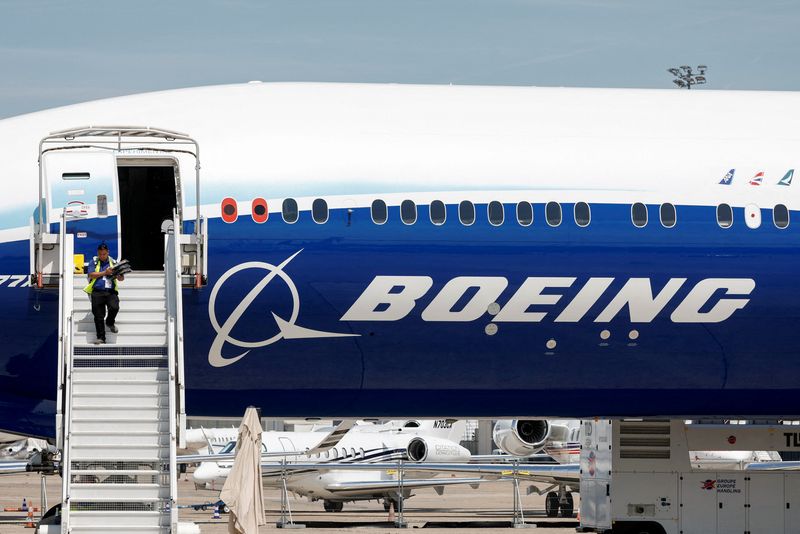By David Shepardson
(Reuters) -Striking machinists at Boeing (NYSE:BA) will vote Wednesday on a new contract proposal that includes a 35% pay hike over four years that could end a costly five-week-old strike, the company and union said Saturday.
Around 33,000 of Boeing's unionized West Coast workers, most in Washington state, have been on strike since Sept. 13. The work stoppage has halted production of the planemaker's best-selling 737 MAX and its 767 and 777 widebodies, putting added pressure on the company's already fragile finances.
The latest offer includes a $7,000 ratification bonus, reinstated incentive plan and enhanced contributions to workers' 401(k) retirement plans including a one-time $5,000 contribution plus up to 12% in employer contributions, International Association of Machinists and Aerospace Workers Local 751 said.
Boeing said Saturday it looks "forward to our employees voting on the negotiated proposal." Still there is no guarantee workers will approve the offer after they overwhelmingly rejected an initial proposal. "The future of this contract is in your hands," the union told workers Saturday.
Earlier in the week, the U.S. Chamber of Commerce pleaded on social media site X for the two sides to reach an agreement that would put an end to the stoppage, which is rippling through the industry, leading Boeing suppliers like Spirit AeroSystems (NYSE:SPR) to announce furloughs.
Boeing on Oct. 8 withdrew its enhanced offer that included a 30% wage increase over four years, after talks also attended by federal mediators broke down. The union has been seeking a 40% hike and restoration of a defined benefit pension, which was not offered in the new contract proposal.
Two senior union officials in Seattle told Reuters they believed the members would vote in favor of the deal, although they expected a backlash from older workers who were demanding a defined-benefit pension be reinstated by Boeing.
In September, nearly 95% of the West Coast workers rejected a tentative agreement offering a 25% pay rise over four years that had been endorsed by union officials, prompting the strike.
That first tentative deal also had a $3,000 signing bonus which some Boeing workers told Reuters was too low, given that prior deals had bonuses of at least $5,000.
The union said on Saturday in a social media post that with the help of Acting U.S. Secretary of Labor Julie Su they had received a "negotiated proposal" and told striking workers it "is worthy of your consideration."
On Monday, Su was in Seattle for her first in-person effort to help reach a new Boeing contract and returned on Thursday night to resume efforts after a trip to Detroit.
A spokesperson for Su said Friday the secretary was in Seattle having discussions with both parties and had met with Boeing CEO Kelly Ortberg and the union.
While some reaction on social media sites on Saturday afternoon was favorable to the new deal, it's not yet clear how the workers will vote.
A spokesperson for the White House said “President (Joe) Biden believes the collective bargaining process is the best way to achieve good outcomes for workers, and the ultimate decision on a contract will be for the union workers to decide.”
Last Friday, Boeing announced it would cut 17,000 jobs, or 10% of its global staff and take $5 billion in charges, continuing a year of tumult for the company since a new Alaska Airlines 737 MAX 9 airplane suffered a mid-air emergency.
Boeing announced a window for up to $25 billion in stock and debt offerings over the next three years on Tuesday, as well as a $10-billion credit agreement.
Boeing has been facing ongoing pressure since a door panel flew off a new 737 MAX 9 jet in midair in January prompting the Federal Aviation Administration to bar the planemaker from increasing production. The FAA opened a new safety inquiry into Boeing on Friday.
In July, Boeing agreed to plead guilty to a criminal fraud conspiracy charge and agreed to pay at least $243.6 million after breaching a 2021 deferred prosecution agreement.

The labor strife is expected to have a negative impact on October's employment report, which will be published days before the Nov. 5 U.S. presidential election.
Economists estimate that the strike and rolling weekly furloughs of non-striking workers as well as temporary layoffs at Boeing's suppliers subtracted as many as 50,000 jobs from nonfarm payrolls this month. The economy added 254,000 jobs in September and the unemployment rate fell to 4.1% from 4.2% in August.
